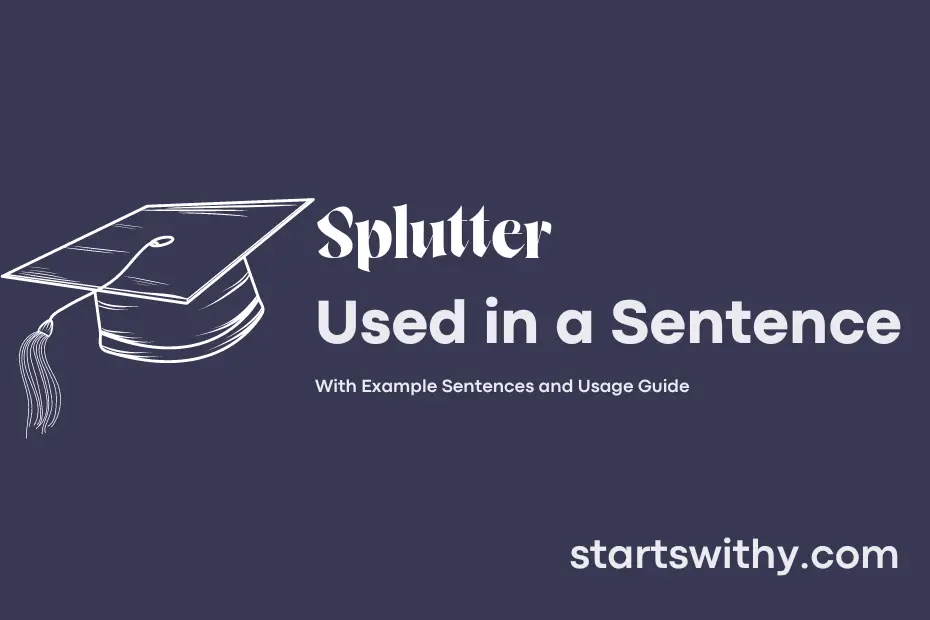Have you ever heard someone speak in a halting, disjointed manner, as if their words were interrupted by abrupt bursts of sound? This phenomenon is known as a “splutter.” When someone splutters, their speech is characterized by stops and starts, creating a choppy and uneven flow of words.
The act of spluttering can often be a sign of indecision, emotional distress, or physical discomfort. It may manifest in various ways, such as stammering, stuttering, or pausing frequently during speech. In some cases, a person may splutter due to surprise, excitement, or sheer overwhelm. Let’s explore the nuances of this unique speech pattern and how it can impact communication.
7 Examples Of Splutter Used In a Sentence For Kids
- The car engine started to splutter.
- Grandpa’s old motorbike would often splutter before starting.
- The kettle began to splutter as it came to a boil.
- When the baby laughed too hard, he would splutter with joy.
- The rain made the campfire splutter and sizzle.
- The frog tried to splutter out a croak but it came out as a squeak.
- The old pipe would always splutter before water flowed out.
14 Sentences with Splutter Examples
- While giving a presentation, the nervous speaker spluttered a few times before gaining confidence.
- The professor started to splutter in surprise when a student asked a challenging question.
- During a debate competition, a participant spluttered in disbelief at the misinformation presented by the opposing team.
- Trying to explain a complex concept, the student spluttered as they struggled to find the right words.
- Spluttering with laughter, the group of friends enjoyed a hilarious meme that was shared in their WhatsApp group.
- The coffee machine spluttered as it tried to dispense the last drops of coffee for the tired students in the library.
- A student spluttered in frustration as they realized they had forgotten to save their research paper before the computer crashed.
- Walking through the rain, the college student spluttered as a passing car drove through a puddle and splashed them.
- The candidate spluttered during their job interview when asked about their long-term career goals.
- In the middle of a heated debate, a student spluttered angrily as their points were being dismissed without consideration.
- The professor spluttered in disapproval when students in the back row were whispering during the lecture.
- Attempting to start their motorcycle in the cold morning air, the student spluttered the engine a few times before it finally roared to life.
- Watching a horror movie marathon, the students spluttered in fear at every jump scare.
- In the college canteen, a student spluttered in shock at the high prices of the food items on the menu.
How To Use Splutter in Sentences?
To use the word Splutter in a sentence, simply follow these easy steps:
-
Understand the meaning of Splutter: Splutter is a verb that means to speak in a quick and confused way, often stopping or repeating sounds.
-
Choose a context: Think of a situation where someone is speaking quickly and incoherently, perhaps due to being flustered or excited.
-
Construct a sentence: Begin your sentence with a subject, followed by the action of Spluttering, and then the rest of the sentence. For example, “She began to splutter her words when asked to speak in front of the large crowd.”
-
Practice pronunciation: Say the sentence out loud a few times to make sure you are comfortable with the pronunciation of Splutter.
-
Use proper punctuation: Remember to punctuate your sentence correctly to convey the tone of Spluttering. You can use exclamation marks, ellipses, or commas to indicate the stuttering speech pattern.
-
Experiment with different scenarios: Try incorporating Splutter into various sentences to get a better grasp of its usage and to become more confident in using it.
By following these steps, you will be able to effectively incorporate Splutter into your sentences with ease and clarity. Practice using this word in different contexts to improve your language skills and expand your vocabulary.
Conclusion
In conclusion, sentences with “splutter” demonstrate the action of speaking interruptedly or in a confused manner, often indicating a struggle to articulate thoughts clearly. This word is used to depict moments of hesitation, surprise, or agitation in speech, highlighting an individual’s emotional state or lack of composure. Whether describing a character’s dialogue in a story or a real-life encounter, sentences with “splutter” effectively convey moments of confusion or disarray in communication.
By examining sentences with “splutter,” readers can better understand the complexities of human interaction and communication. The use of this word adds depth to narratives by illustrating the challenges individuals face in expressing themselves, ultimately enriching the portrayal of emotions and experiences within written and spoken language.



